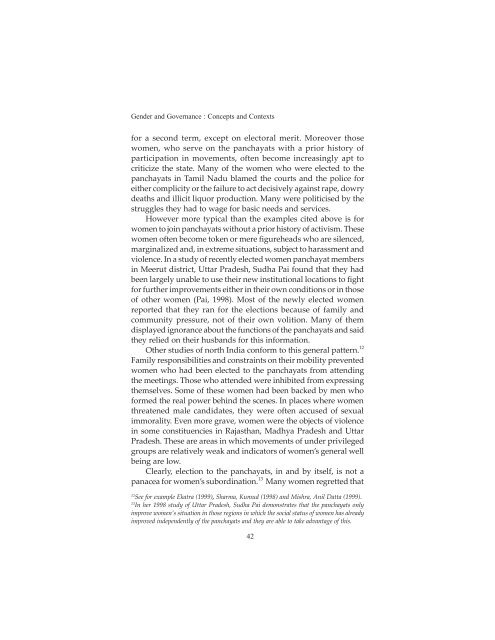Essays On Gender And Governance - United Nations Development ...
Essays On Gender And Governance - United Nations Development ...
Essays On Gender And Governance - United Nations Development ...
Create successful ePaper yourself
Turn your PDF publications into a flip-book with our unique Google optimized e-Paper software.
<strong>Gender</strong> and <strong>Governance</strong> : Concepts and Contexts<br />
for a second term, except on electoral merit. Moreover those<br />
women, who serve on the panchayats with a prior history of<br />
participation in movements, often become increasingly apt to<br />
criticize the state. Many of the women who were elected to the<br />
panchayats in Tamil Nadu blamed the courts and the police for<br />
either complicity or the failure to act decisively against rape, dowry<br />
deaths and illicit liquor production. Many were politicised by the<br />
struggles they had to wage for basic needs and services.<br />
However more typical than the examples cited above is for<br />
women to join panchayats without a prior history of activism. These<br />
women often become token or mere figureheads who are silenced,<br />
marginalized and, in extreme situations, subject to harassment and<br />
violence. In a study of recently elected women panchayat members<br />
in Meerut district, Uttar Pradesh, Sudha Pai found that they had<br />
been largely unable to use their new institutional locations to fight<br />
for further improvements either in their own conditions or in those<br />
of other women (Pai, 1998). Most of the newly elected women<br />
reported that they ran for the elections because of family and<br />
community pressure, not of their own volition. Many of them<br />
displayed ignorance about the functions of the panchayats and said<br />
they relied on their husbands for this information.<br />
Other studies of north India conform to this general pattern. 12<br />
Family responsibilities and constraints on their mobility prevented<br />
women who had been elected to the panchayats from attending<br />
the meetings. Those who attended were inhibited from expressing<br />
themselves. Some of these women had been backed by men who<br />
formed the real power behind the scenes. In places where women<br />
threatened male candidates, they were often accused of sexual<br />
immorality. Even more grave, women were the objects of violence<br />
in some constituencies in Rajasthan, Madhya Pradesh and Uttar<br />
Pradesh. These are areas in which movements of under privileged<br />
groups are relatively weak and indicators of women’s general well<br />
being are low.<br />
Clearly, election to the panchayats, in and by itself, is not a<br />
panacea for women’s subordination. 13 Many women regretted that<br />
12<br />
See for example Ekatra (1999), Sharma, Kumud (1998) and Mishra, Anil Datta (1999).<br />
13<br />
In her 1998 study of Uttar Pradesh, Sudha Pai demonstrates that the panchayats only<br />
improve women’s situation in those regions in which the social status of women has already<br />
improved independently of the panchayats and they are able to take advantage of this.<br />
42

















